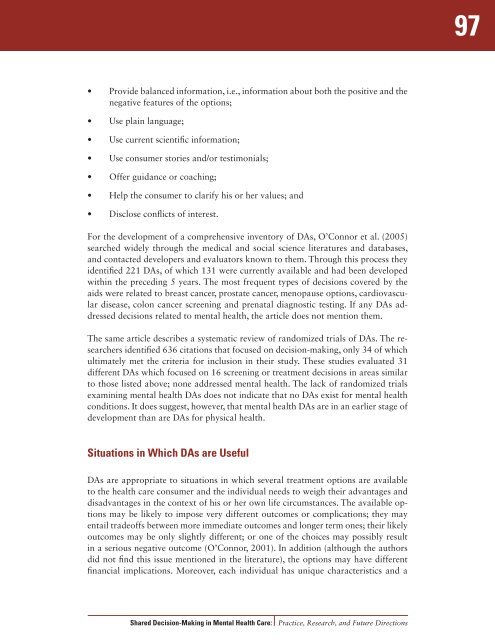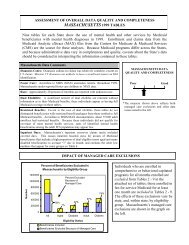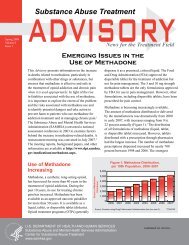96begun to measure the impact of SDM and to determ<strong>in</strong>e whether it can achieve thesegoals. Some recent studies have found use of DAs to have a positive effect on consumersatisfaction (O’Connor et al., 2004; Thistlethwaite, Evans, Tie, & Heal, 2006).Def<strong>in</strong>ition of <strong>Decision</strong> Aid (DA)<strong>Decision</strong> aids (DAs), accord<strong>in</strong>g to Adams and Drake, “are <strong>in</strong>formation <strong>in</strong>terventionsthat help clients to understand the pros and cons of a medical decision and may also<strong>in</strong>clude exercises to help clients clarify their own values and preferences. They can beself-adm<strong>in</strong>istered or used with a practitioner” (2006, p. 96). DAs are not the same ashealth education materials; they focus explicitly on alternatives <strong>in</strong> order to prepareconsumers to make important decisions (O’Connor et al., 2003). Nor are DAs simplybrochures or booklets developed by pharmaceutical companies or other entitieswhose ostensible purpose may be to educate, but whose actual <strong>in</strong>tent is to validateand encourage the use of a specific therapeutic <strong>in</strong>tervention.However, <strong>in</strong>formation is never value neutral. If a consumer received every bit of <strong>in</strong>formationavailable on a particular topic, the result<strong>in</strong>g document would be several<strong>in</strong>ches thick and serve no purpose. There are always values beh<strong>in</strong>d decisions aboutwhat to <strong>in</strong>clude and what to omit from patient <strong>in</strong>formation, especially what typeand level of risk is mean<strong>in</strong>gful for the consumer. If the writer of an <strong>in</strong>formationaldocument really feels medication is valuable <strong>in</strong> most cases, this belief will be evident<strong>in</strong> the material; if the writer feels that medication is overused and should be avoidedunless it is absolutely essential, then this notion will be part of the fabric of the presentation,even if he or she is try<strong>in</strong>g to be neutral. Furthermore, the format <strong>in</strong> whichthe <strong>in</strong>formation is presented may also <strong>in</strong>fluence the reader (Wills & Holmes-Rovner,2003). Indeed, it is worth not<strong>in</strong>g that research has demonstrated the effect of the useof positive or negative frames <strong>in</strong> describ<strong>in</strong>g the advantages and risks associated withmedical <strong>in</strong>terventions (O’Connor, Pennie, & Dales, 1996).DAs have been developed and used far more widely for physical health care than formental health care. The International Patient <strong>Decision</strong> Aid Standards (IPDAS) Collaboration,a group of researchers, practitioners, and stakeholders, used a two-stageconsensus process to develop criteria by which DAs can be evaluated. Accord<strong>in</strong>g toIPDAS (2005), each DA should:• Include <strong>in</strong>formation about the available options;• Describe what happens <strong>in</strong> the natural course of the condition if no actionis taken;• Present the probabilities of various outcomes;<strong>Shared</strong> <strong>Decision</strong>-<strong>Mak<strong>in</strong>g</strong> <strong>in</strong> <strong>Mental</strong> <strong>Health</strong> <strong>Care</strong>: Practice, Research, and Future Directions
97• Provide balanced <strong>in</strong>formation, i.e., <strong>in</strong>formation about both the positive and thenegative features of the options;• Use pla<strong>in</strong> language;• Use current scientific <strong>in</strong>formation;• Use consumer stories and/or testimonials;• Offer guidance or coach<strong>in</strong>g;• Help the consumer to clarify his or her values; and• Disclose conflicts of <strong>in</strong>terest.For the development of a comprehensive <strong>in</strong>ventory of DAs, O’Connor et al. (2005)searched widely through the medical and social science literatures and databases,and contacted developers and evaluators known to them. Through this process theyidentified 221 DAs, of which 131 were currently available and had been developedwith<strong>in</strong> the preced<strong>in</strong>g 5 years. The most frequent types of decisions covered by theaids were related to breast cancer, prostate cancer, menopause options, cardiovasculardisease, colon cancer screen<strong>in</strong>g and prenatal diagnostic test<strong>in</strong>g. If any DAs addresseddecisions related to mental health, the article does not mention them.The same article describes a systematic review of randomized trials of DAs. The researchersidentified 636 citations that focused on decision-mak<strong>in</strong>g, only 34 of whichultimately met the criteria for <strong>in</strong>clusion <strong>in</strong> their study. These studies evaluated 31different DAs which focused on 16 screen<strong>in</strong>g or treatment decisions <strong>in</strong> areas similarto those listed above; none addressed mental health. The lack of randomized trialsexam<strong>in</strong><strong>in</strong>g mental health DAs does not <strong>in</strong>dicate that no DAs exist for mental healthconditions. It does suggest, however, that mental health DAs are <strong>in</strong> an earlier stage ofdevelopment than are DAs for physical health.Situations <strong>in</strong> Which DAs are UsefulDAs are appropriate to situations <strong>in</strong> which several treatment options are availableto the health care consumer and the <strong>in</strong>dividual needs to weigh their advantages anddisadvantages <strong>in</strong> the context of his or her own life circumstances. The available optionsmay be likely to impose very different outcomes or complications; they mayentail tradeoffs between more immediate outcomes and longer term ones; their likelyoutcomes may be only slightly different; or one of the choices may possibly result<strong>in</strong> a serious negative outcome (O’Connor, 2001). In addition (although the authorsdid not f<strong>in</strong>d this issue mentioned <strong>in</strong> the literature), the options may have differentf<strong>in</strong>ancial implications. Moreover, each <strong>in</strong>dividual has unique characteristics and a<strong>Shared</strong> <strong>Decision</strong>-<strong>Mak<strong>in</strong>g</strong> <strong>in</strong> <strong>Mental</strong> <strong>Health</strong> <strong>Care</strong>: Practice, Research, and Future Directions
- Page 4:
iiContentsIntroduction ............
- Page 11 and 12:
5outpatient commitment (Holmes-Rovn
- Page 13 and 14:
7Advantages• Practitioners can be
- Page 15:
9Section 2The Practice of SharedDec
- Page 22 and 23:
16Section 3SDM ResearchCurrent rese
- Page 24:
18Mental health care providers are
- Page 27 and 28:
21want mental health treatment or d
- Page 29:
23Some participants raised concerns
- Page 37 and 38:
31Section 6ConclusionsShared decisi
- Page 39 and 40:
33Fellowes, D., Wilkinson, S., & Mo
- Page 41 and 42:
35Power, A. Kathryn. (July 10, 2007
- Page 43 and 44:
37Appendix AResourcesThis list is p
- Page 45 and 46:
39Appendix BShared Decision-MakingM
- Page 47 and 48:
41Annelle Primm, M.D., M.P.H.Direct
- Page 49 and 50:
43Supplement 1Shared Decision-Makin
- Page 51 and 52: 45IntroductionThe consumer-driven r
- Page 53 and 54: 47Background: Definitions of SDM an
- Page 55 and 56: 49• Freedom to live in the commun
- Page 57 and 58: 51providers only (Wills & Homes-Rov
- Page 59: 53SDM for Schizophrenia TreatmentBu
- Page 63 and 64: 57I interact with my consumers; I f
- Page 65 and 66: 59ReferencesAdams, J. R., & Drake,
- Page 67 and 68: 61Elwyn, G., Edwards, A., Kinnersle
- Page 69 and 70: 63Murray, E., Pollack, L., White, M
- Page 71 and 72: 65Thistlethwaite, J., Evans, R., Ti
- Page 73 and 74: 67AbstractShared decision-making is
- Page 75 and 76: 69Confronting Critical Challenges:
- Page 77 and 78: 71into treatment should still be in
- Page 79 and 80: 73these approaches, people are more
- Page 81 and 82: 75consumers to engage with their pr
- Page 83 and 84: 77that were produced in the U.S., w
- Page 85 and 86: 79a healing partnership and develop
- Page 87 and 88: 81Shared Decision-Making in Mental
- Page 89 and 90: 83However, peer support requires st
- Page 91 and 92: 85ConclusionsImplementation of SDM
- Page 93 and 94: 87Fellowes, D., Wilkinson, S., & Mo
- Page 95 and 96: 89President’s Commission for the
- Page 97 and 98: 91Supplement 3Aids to Assist Shared
- Page 99 and 100: 93IntroductionSignificance of Share
- Page 101: 95In recent years, a variety of tec
- Page 105 and 106: 99Form of Access or AdministrationC
- Page 107 and 108: 101ences). Some of these Web-based
- Page 109 and 110: 103video about shared decision-maki
- Page 111 and 112: 105clarify one’s own values and p
- Page 113 and 114: 107potential results, than on quant
- Page 115 and 116: 109Once again, however, it is worth
- Page 117 and 118: 111who belong to minority groups or
- Page 119 and 120: 113Hamann, J., Langer, B., Winkler,
- Page 122: U.S. DEPARTMENT OF HEALTH AND HUMAN
















